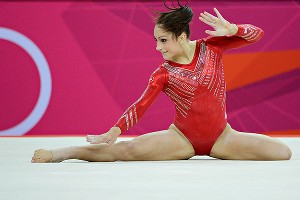LONDON -- There was no need for a Kerri Strug/Wheaties box cover/"SportsCenter" moment when the U.S. women won their first Olympic team gold medal since the 1996 Atlanta Games. And if Bela Karolyi was going to carry a hero to the podium Tuesday, he would have risked a hernia from carrying the whole American team.
Whether these 2012 gold medalists are the best group of American Olympic gymnasts can be debated -- though U.S. coach Marta Karolyi says they are -- but they are almost certainly the best team.
"That [1996 gold-medal squad] was a beautiful team made up from great individual athletes," Bela Karolyi said when asked to compare the two gold-medal teams. "Dominique Dawes, Shannon Miller, Amy Chow -- all these great kids; but they trained in different ways. When we got them together, it was a beautiful bouquet of individual athletes rather than a team. And that made a big difference tonight."
What also made the difference was the mental and competitive edge the Americans had, an edge exemplified by Jordyn Wieber.
Wieber is the reigning all-around world champ, but she won't get a chance to win gold or any medal in the individual event later this week. A new rule restricts the number of gymnasts in the all-around final to two per country, and Wieber was edged out by Gabby Douglas and Aly Raisman after finishing fourth in qualifying.
"She was hammered by a stupid rule, a stupid rule," Karolyi said. "To eliminate the best gymnast in the Olympic final? That isn't an Olympic final, that's an Olympic invitational."
Wieber put aside the qualifying loss, received a pep talk from teammate McKayla Maroney and went out determined to help her team win gold Tuesday.
"She proved she has a very strong character," Marta Karolyi said. "That she's a fighter, and if she has a situation that puts her down, she is able to fight back. She wanted to prove herself that she is one of the highest international gymnasts."
Wieber so wanted to put Sunday's disappointment behind her that she didn't even wait for the arena announcer to finish her introduction Tuesday before she started flying down the runway for her vault in the first rotation. "I was just ready to go," she said. "I just wanted to get the best start I could and ended up sticking it."
She did, receiving a score of 15.933. Then Douglas posted a 15.966. And then Maroney received a 16.233 with a jaw-dropping vault. And when the rotation was over, the Americans had a lead they would not surrender the rest of the event.
"It was definitely a confidence builder," said Douglas, who piled up a score of 61.465 in four rotations. "When [Wieber] nailed that vault, it was contagious. It was, 'OK, I'm going to nail this vault, too.' And we all nailed it. And it's contagious from there. It goes over to the bars, to the beam, to the floor."
Part of the reason the confidence continued was that mental edge again, plus intense preparation. Marta Karolyi and the staff put the team through intense rehearsals leading into Tuesday's competition, even piping in recorded crowd noise at odd moments to simulate competition conditions. "Everything was implemented in preparations," Karolyi said.
So while the other teams were slipping -- 2008 champion China finished fourth behind silver medal-winning Russia and bronze medalist Romania -- the U.S. just kept rolling, with not a single bad routine and only two with a score lower than 15. Bela Karolyi said he has rarely seen such a 12-for-12 performance and not since Soviet times.
Marta Karolyi said she was confident the Americans would win after their strong balance-beam performance in the third rotation, and the gold medal was all but guaranteed when two Russian gymnasts stumbled in their floor routines just ahead of the United States. To stay focused, the Americans were trying their best not to watch the Russians, but couldn't help but realize what happened from the crowd reaction.
"When the crowd goes, 'Uhhhh,' you just know something went wrong," Douglas said. "So we knew."
The U.S. had such a commanding 10-point lead as it started the floor routine that all it had to do was avoid tripping on the mat. The Americans did just that, performing superbly to clinch the gold by more than eight points over Russia. They hugged, they shouted, they celebrated. They were Olympic champions.
"I think this is really important just for a little redemption," Wieber said. "It definitely was a disappointment with the new rules [in the all-around] and it kind of stinks, but in the end, I wind up with a gold medal."
Where the Americans get their mental edge became obvious when the Karolyis talked about how the athletes would not let down following this gold. They will not go shopping, they will not go sightseeing, they will not lose focus until the competition is over here. And even then, they won't let down.
"It's a fantastic achievement, but at the same time, we don't need to get our noses up in the air because you are just as good as you are on your performance day," Marta Karolyi said. "This is the result of a lot of work for many, many years, and if you want to stay competitive, we have to follow with the same level. We can't think, 'Just because we're Olympic [champions], we can relax.'"
After all, the U.S. will need to defend its medal in Rio in 2016. And that's just four years away. Better get back in the gym.
Courtesty of ESPN.com


No comments:
Post a Comment